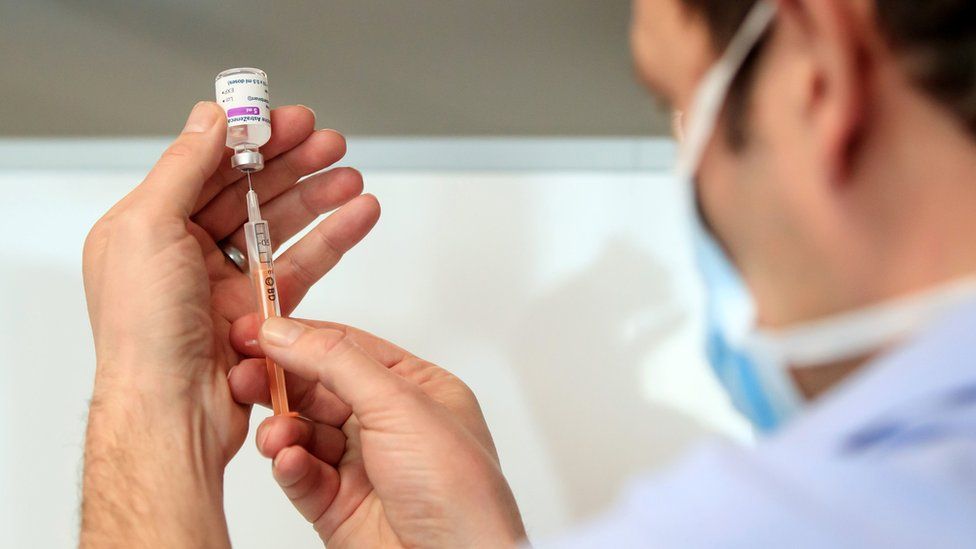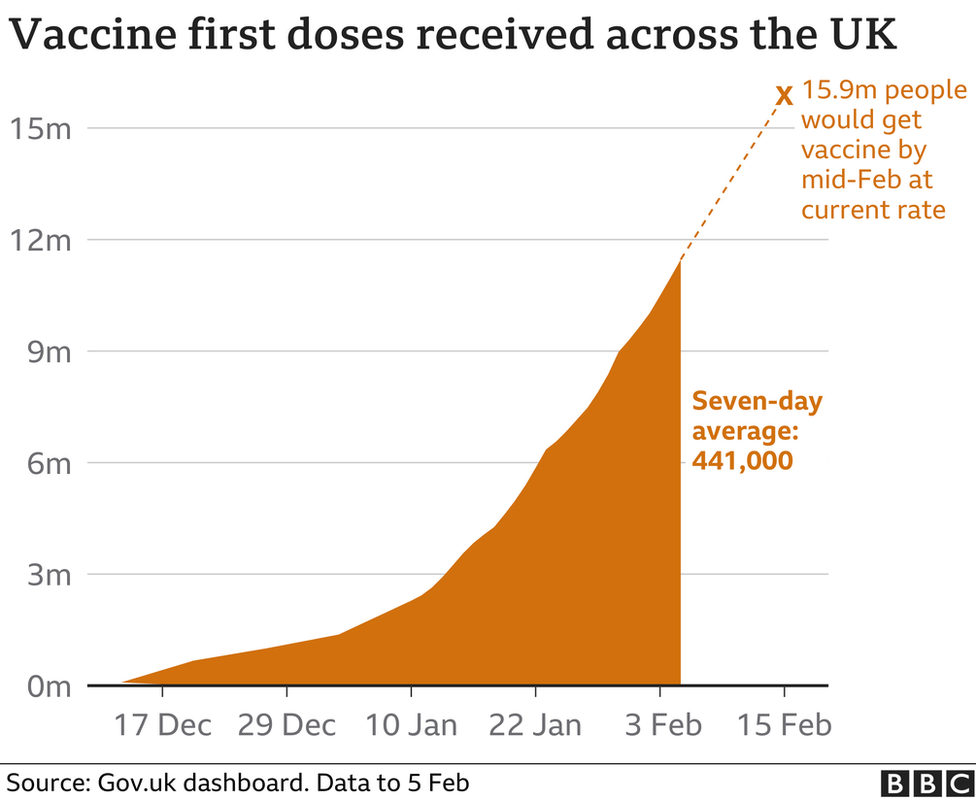Covid: Oxford jab protection against South Africa variant ‘limited’

The Oxford-AstraZeneca Covid jab gives limited protection against mild disease caused by the South Africa variant, the firm said early trials had suggested.
It also said it had not yet fully determined whether the vaccine protects against severe disease caused by the more transmissible coronavirus variant.
The preliminary findings from a small study of more than 2,000 people have not yet been peer-reviewed.
More than 100 cases of the South Africa variant have been found in the UK.
- When will I get the coronavirus vaccine?
- How worrying are the new variants?
- South Africa coronavirus variant: What’s the risk?
- Five reasons to be (cautiously) hopeful on Covid
The preliminary findings, first reported by the Financial Times, suggest the vaccine offers limited protection against mild and moderate disease caused by the variant.
The study is due to be published on Monday.
A spokesman for AstraZeneca said they had not yet been able to properly establish whether the jab would prevent severe disease and hospitalisation caused by the South Africa variant because those involved in the study had predominantly been young, healthy adults.
But the company expressed confidence that the vaccine would offer protection against serious cases, because it created neutralising antibodies similar to those of other coronavirus vaccines.
A spokesman for AstraZeneca said the company and the University of Oxford had started adapting the vaccine against the South Africa variant, adding that a new vaccine to work against mutated versions of the virus could be ready to deploy in the autumn if needed.
Dr Michael Head, a senior research fellow in global health at the University of Southampton, said that if the Oxford-AstraZeneca vaccine was less protective against mild disease but prevented severe disease this would “still be a pretty good outcome”.
“I don’t think we need to be too alarmed by [the reported findings] as yet but we do need to see the full study to work out what the implications really are,” he told the BBC.
Dr Nikki Kanani, medical director of primary care at NHS England, encouraged people to take a vaccine when offered, adding that evidence shows they are “very protective” – particularly against hospitalisation and death from Covid.
However, she told BBC Breakfast that scientists will have to keep looking at how coronavirus vaccines are working as they will likely have to be given on a yearly basis to “reflect any changes” in variants of the virus, like the flu jab.

- LOOK-UP TOOL: How many cases in your area?
- OXFORD JAB: What is the Oxford-AstraZeneca vaccine?
- SYMPTOMS: What are they and how to guard against them?
- QUARANTINE: Will I need to self-isolate in a hotel?

It comes as the company on Saturday said its vaccine provided good protection against the variant first discovered in Kent, which is now dominant in the UK.
Current vaccines were designed around earlier versions of coronavirus, but scientists believe they should still work against the new ones, although it is not yet clear how well against different mutations.
Early results suggest the Pfizer-BioNTech vaccine protects against the new variants.
Data on two new coronavirus vaccines that could be approved soon – one from Novavax and another from Janssen – appear to offer some protection.
And early results from Moderna suggest its vaccine is still effective against the South Africa variant.
Experts say vaccines could be redesigned and tweaked to be a better match for new variants in a matter of weeks or months if necessary.


- Meanwhile, workplace Covid testing is being offered to more companies in England and GPs will be paid an additional £10 by the NHS for every housebound patient they vaccinate
- Surge testing is being rolled out in more areas of England to help control and suppress the spread of new variants, including in parts of Worcestershire, the PR9 postcode area of Sefton, Merseyside, and areas in Bristol and South Gloucestershire.
- The UK government is aiming to offer all over-50s a coronavirus jab by May, with 15 million people in priority groups vaccinated by 15 February.
- As of Friday more than 11.4 million people had received a first dose.
- The latest figures also showed another 828 people in the UK have died within 28 days of a positive Covid test, and there were a further 18,262 cases.

- THE THURSDAY MURDER CLUB: Escape with Richard Osman’s bestselling crime novel…
- RADIO 1’S CHILL MIX: Soothing musical vibes to soundtrack your weekend in lockdown


Have you been affected by issues relating to the vaccine rollout? Share your experiences by emailing haveyoursay@bbc.co.uk.
Please include a contact number if you are willing to speak to a BBC journalist. You can also get in touch in the following ways:
- WhatsApp: +44 7756 165803
- Tweet: @BBC_HaveYourSay
- Upload pictures or video
- Please read our terms & conditions and privacy policy
If you are reading this page and can’t see the form you will need to visit the mobile version of the BBC website to submit your question or comment or you can email us at HaveYourSay@bbc.co.uk. Please include your name, age and location with any submission.
Published at Sun, 07 Feb 2021 08:36:16 +0000





Comments
Loading…